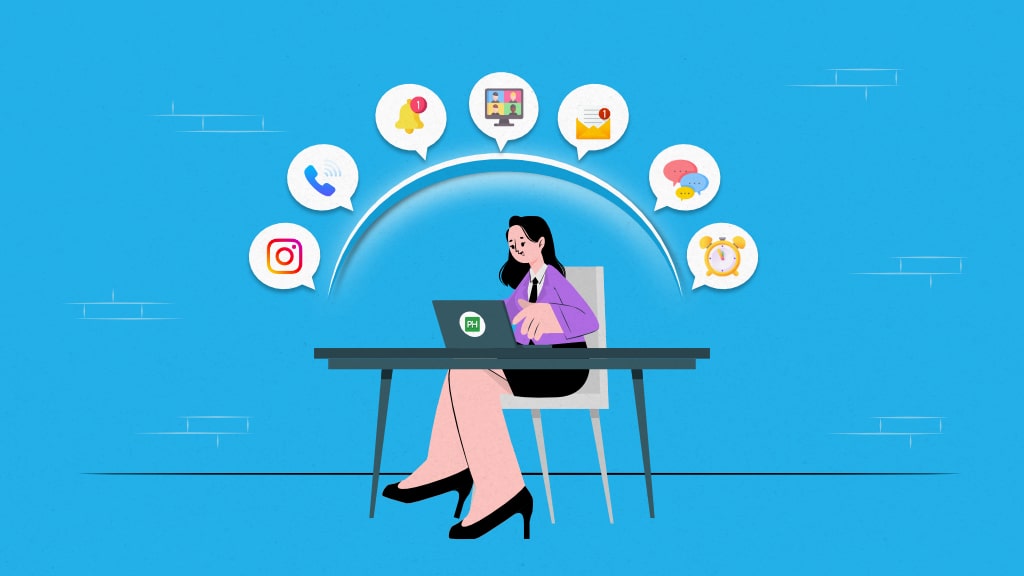Imagine you are working on an important project whose deadline is just a day away! A notification pops up. Before you know it, you’re scrolling through emails, then chatting about weekend plans, and your focus is gone.
Does it look familiar? If it does, you’re not alone. Workplace distractions consume an average of 2.1 hours a day, leaving employees frustrated and exhausted. The stakes for managers are even higher because distractions often trickle down to your team.
Distractions can derail even the most qualified teams. I’ve also been there — attending back-to-back meetings, urgent emails, and the occasional coffee break chatter. It’s about losing time, momentum, creativity, and the energy to lead effectively.
Distractions are everywhere – from the constant ping of notifications to impromptu discussions and even our wandering minds. So, how to avoid distractions at work and stay on track?
Don’t worry! You have come to the right place. In this article, I’ve rounded up some amazing strategies to help you tackle the distractions head-on.
You’ll also explore the distractions that can hinder your workflow and learn practical solutions to regain control of your time.
So, read on to reclaim your focus and boost your team’s performance. But before we jump to the solutions, let’s cover some nitty-gritty details to understand the cause of these distractions.
Why avoiding distractions is important at work?
For a manager, staying focused is a personal challenge and a priority for the team and the organization. Distractions can lower productivity, morale, and even company profits. So, you need to create a distraction-free environment to lead your teams effectively.
Let’s explore why avoiding distractions is important for your work:
- Boost productivity
Distractions derail workflows and drain your precious time. A study from UC Irvine reveals that an average employee takes 23 minutes and 15 seconds to refocus after each interruption.
Multiply that by daily distractions, and you will find that you have lost your entire work hours. Avoiding discussions allows you and your teams to complete tasks efficiently, leaving room for innovation and brainstorming.
- Enhance work quality
Frequent interruptions lead to mistakes. Whether creating a detailed report or brainstorming strategies, quality suffers when attention is divided.
Deep work ensures sharper focus and better decision-making. Also, you need to prioritize what matters most to achieve better results.
- Reduce stress and prevent burnout
Interruptions can create chaos in your workflow. Employees juggling deadlines and distractions often feel overwhelmed, leading to stress and burnout.
By fostering a focused environment, you’re not just improving work-life balance; you’re boosting your productivity.
- Support team dynamics
Distractions don’t happen in isolation. When one person loses focus, it impacts team synergy. For example, constant phone-checking in a meeting disrupts the flow and sends the wrong message.
Set focus-friendly policies like “no-device zones” or schedule quiet hours to cultivate a culture of respect and productivity.
- Advance career growth
Staying focused helps individuals consistently deliver high-quality work, meet deadlines, and stand out as reliable contributors.
For managers, this builds trust with higher-ups and creates opportunities for growth. Focus allows you to build a strong and trustworthy reputation.
- Minimize financial losses
Distractions come with a hefty price tag. Workplace distractions cost U.S. companies around $650 billion annually.
By reducing unnecessary interruptions, you’re safeguarding your individual productivity as well as your organization’s overall efficiency.
What are the different types of distractions at work?
Did you know that the average employee is interrupted every 11 minutes? This alarming trend underscores the hidden productivity toll of workplace distractions.
As a manager, you need to understand these distractions to eliminate them.
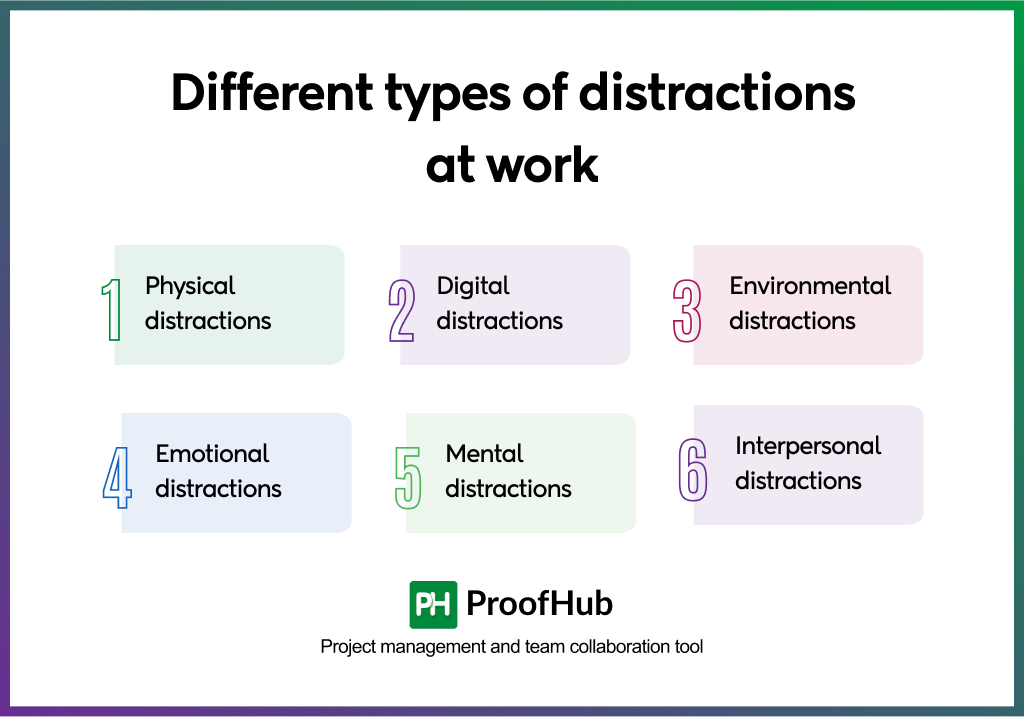
Here are six main types of workplace distractions that can affect your team:
1. Physical distractions: From noisy conversations nearby to cluttered desks and uncomfortable seating, physical distractions are the most noticeable.
Imagine you are trying to focus while someone in your team is loudly discussing weekend plans a few feet away. It can be incredibly hard to concentrate with all that noise around you. Simply put, a noisy office negatively affects your and your team’s productivity.
2. Digital distractions: Notifications are the biggest productivity hurdles. Whether it’s email pings, social media updates, or instant messages, these interruptions chip away at focus.
In fact, an average employee checks emails or communication apps every 6 minutes. This means less time for strategic thinking and more time spent on reactive tasks.
3. Environmental distractions: Ever wondered why it is challenging to stay productive in a poorly lit room or an office that’s too hot or cold?
Environmental factors like lighting, temperature, and noise levels have a significant effect on focus levels. If you make adjustments to these elements, it can significantly improve your work efficiency.
4. Emotional distractions: Stress, anxiety, or unresolved personal conflicts can weigh heavily on an employee’s mind.
You need to recognize these subtle distractions and create a supportive work environment for your team members.
5. Mental distractions: Overthinking, daydreaming, or attempting to multitask are common but underestimated distractions.
Multitasking can reduce your productivity by up to 40%. So, as a manager, you need to encourage your team members to avoid multitasking to improve their focus.
6. Interpersonal distractions: Unnecessary or unplanned meetings and interruptions from colleagues are classic examples of interpersonal distractions.
You can foster a planned and focused communication culture to minimize these disruptions. You can also use a project management tool like ProofHub to centralize your tasks, teams, and discussions, which eliminates the need for unnecessary meetings.
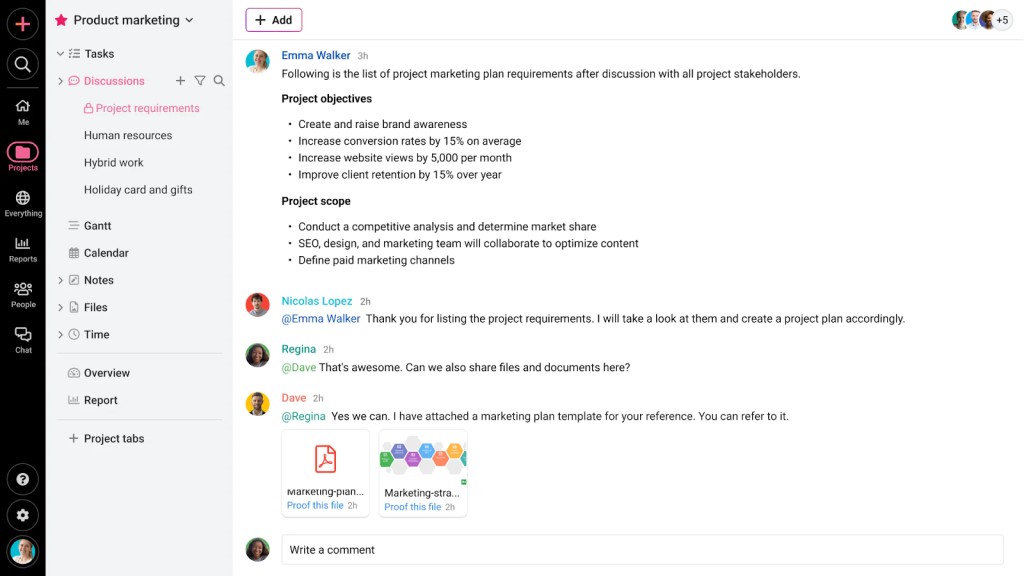
Keep your teams focused and on the same page with ProofHub. Sign up for a 14-day free trial! (No credit card required)
What are common distractions at work?
We’ve all been there – trying to focus on an important task but constantly being pulled in different directions. In today’s fast-paced work environment, distractions are everywhere, and they can seriously hinder productivity.
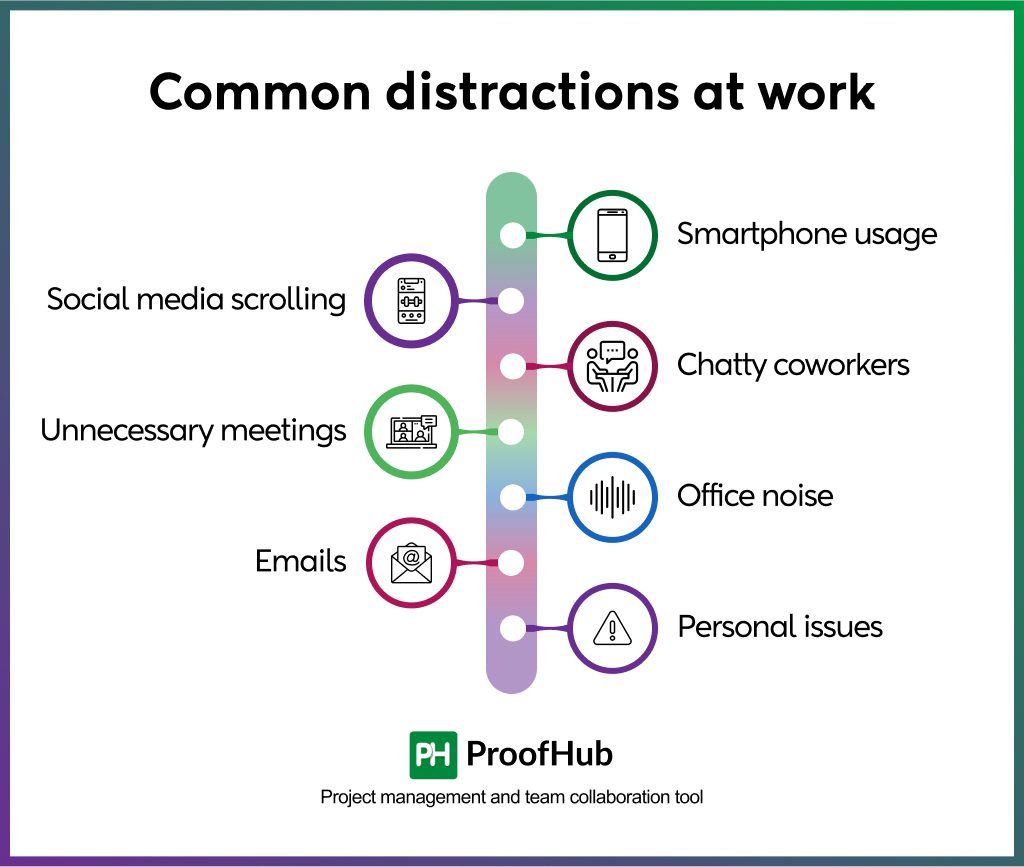
As a manager, you are responsible for addressing these distractions to help your teams stay focused and productive.
Here are some of the most common distractions.
- Smartphone usage: Smartphones are designed to keep us connected, but they’re also a major source of distraction.
With constant pings, social media notifications, and texts, it’s easy for you or your team members to get sidetracked.
To limit smartphone use, you can set up “phone-free” periods during important work hours to maintain focus.
- Social media scrolling: What starts as a quick check of Facebook or Instagram can easily turn into a time-consuming scroll.
In fact, 47% of employees use social media during work hours. This habit can diminish your team’s productivity. So, promote time management practices to keep social media use in check.
- Chatty coworkers: Friendly chats are part of a positive office culture, but they can also disrupt concentration. One can frequently distracted by colleagues who stop by for casual conversations.
While it’s important to nurture team bonding, you must encourage team members to be mindful of when it’s appropriate to engage in social interactions and when focus is needed.
- Unnecessary meetings: In many workplaces, meetings can be an unproductive time sink. Many meetings could be replaced with quick emails or updates, saving valuable time.
To limit unnecessary meetings at your workplace, make sure they have clear objectives, are time-limited, and are truly necessary.
- Office noise: Background noise, like typing, phone calls, or nearby chatter, can make concentrating difficult. Extra noise can significantly lower productivity, especially for tasks requiring deep concentration.
You can create quiet zones or allow your team members to wear noise-canceling headphones to help them avoid these distractions and focus on their tasks.
- Emails: Constantly checking emails is a standard distraction that breaks concentration. Employees spend an average of 28% of their workweek reading and responding to emails.
You can set specific times during the day for checking emails, allowing your team to focus on more important tasks without constant interruptions.
- Personal issues: Personal concerns, whether related to family, finances, or health, can distract employees from their work.
You can support your teams by creating a supportive work environment where employees feel comfortable addressing personal concerns and have access to resources that can help them stay focused.
9 Strategies to avoid distractions at work
“Productivity is never an accident. It is always the result of a commitment to excellence, intelligent planning and focused effort.” – Paul J. Meyer
Workplace distractions are the enemy of productivity. We all wanna work super productively without getting interrupted. Work productivity is always at its peak when you are in the flow. We have to get into the right frame of mind to figure out how to keep things moving forward.
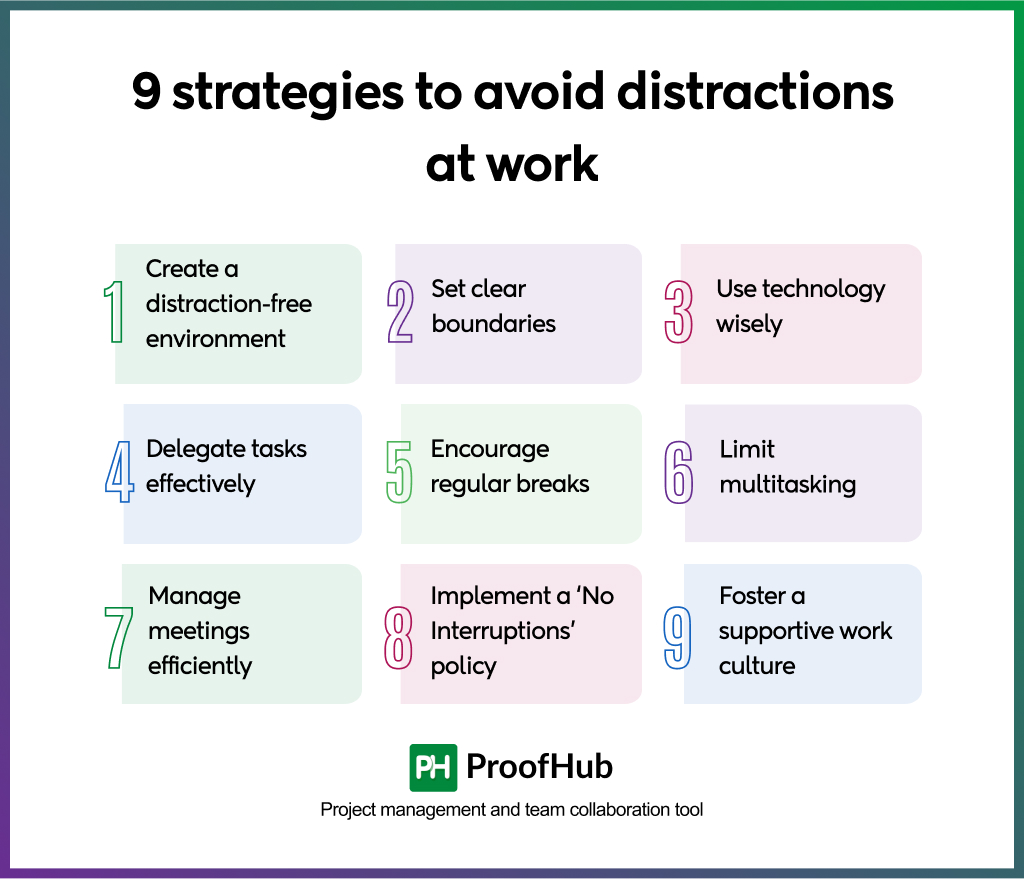
Here are nine effective strategies to help your team stay productive and minimize interruptions.
1. Create a distraction-free environment
To help your team focus, ensure your workspaces are clean and organized, with everything employees need within easy reach. You can encourage your team members to personalize their desks but steer clear of the clutter that could easily divert attention.
A tidy workspace can improve concentration and reduce mental clutter, helping employees stay engaged in their tasks.
Bright office designs will help you find solitude if you want to work undisturbed. Noise equals distractions, so quieten your workspace. Rearrange the office so everyone can work isolated and people passing by don’t disturb each other.
Control other loud distractions by shutting the door, putting on headphones, and soundproofing it from external noises.
2. Set clear boundaries
Team members often get distracted by non-urgent messages and meetings. By encouraging clear boundaries, you can ensure employees know when you are available and when it’s time to focus.
Set ‘focus hours’ during which non-urgent communications are paused. This allows employees uninterrupted time to dive deep into their tasks.
Moreover, cuts down your email checking time. Make it a habit to communicate directly over chat about those small discussions that get stretched in emails. Decide on your email preferences and communicate more for less invasive emailing.
You can also set pop-up notifications to check email less frequently or fix a schedule for yourself to check emails and reply to them. Use your spare time to check the mail while waiting for a client or using a taxi.
3. Use technology wisely
Technology can be both a productivity booster and a source of distraction. Any kind of audible notification is also a massive distraction for workers.
Every kind of notification distraction is a destruction of performance. Apps that frequently notify users make it difficult to concentrate fully on tasks. And all this consumes a lot of time.
So, you probably know the apps that distract you the most but can’t uninstall them, so decide whether you want to be notified all the time.
Closely monitor your schedule to use social media and other sites. Consider turning off notifications for social media sites or giving them a silent ringtone when it’s time to work.
4. Delegate tasks effectively
When tasks are unclear, employees are more likely to interrupt one another with questions or check-ins. Effective task delegation ensures everyone knows their responsibilities and deadlines, reducing the need for constant back-and-forth.
By setting clear priorities and deadlines, your team members can stay on track and avoid multitasking. This results in higher employee satisfaction and fewer distractions, helping teams perform at their best.
You can use a task management tool like ProofHub to create and assign tasks and track progress to minimize interruptions, keeping everyone focused on their work.
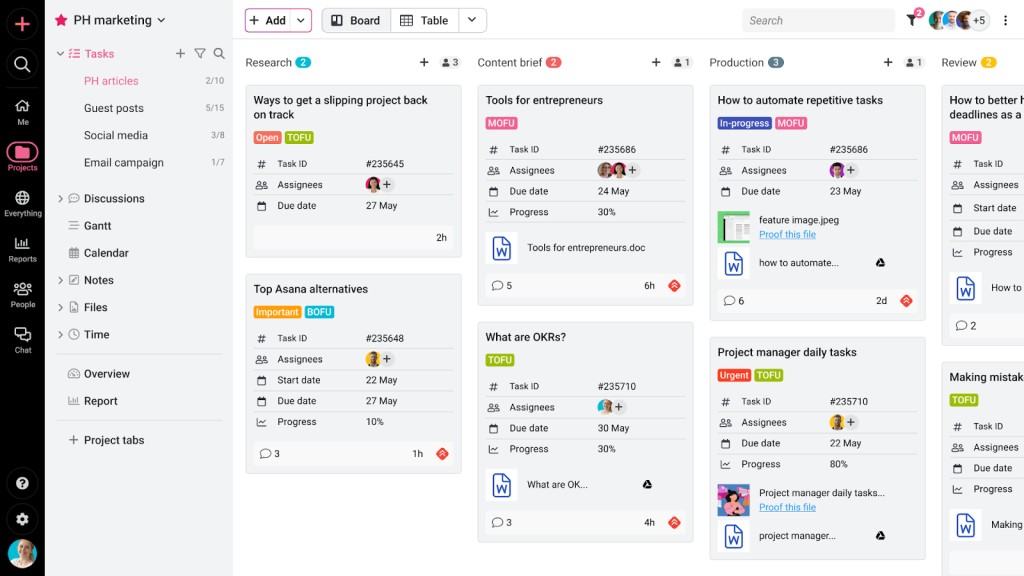
Streamline your workflow with ProofHub and keep everyone on track and focused! Sign up now for a 14-day free trial!
5. Encourage regular breaks
While it may seem counterintuitive, taking regular breaks is essential for maintaining focus. Allow your team to take short breaks throughout the day to refresh their minds and reduce burnout.
You can encourage your team members to use the ‘Pomodoro Technique,’ where they will work for 25 minutes and then take a 5-minute break. This will keep their mind fresh and boost focus.
Regular breaks improve cognitive function, leading to better productivity and fewer distractions during work time.
6. Limit multitasking
Multitasking often leads to scattered attention, which can slow down productivity. Stop being pulled in a million directions, and be sure to end where you start. Don’t be unsure of where you start your tasks.
Start with it, break it into smaller manageable goals, and set up an environment to perform one task at a time. Also, make sure that your team stays focused on one task at a time to improve the quality of their work.
You should emphasize the importance of completing one task before moving to another. This reduces the likelihood of distractions and ensures better results.
7. Manage meetings efficiently
Meetings can be a major source of distraction, especially if they drag on without clear objectives. So, keep meetings short and to the point to ensure they’re productive and don’t disrupt workflow.
Limit your meetings to 30 minutes or less with clear goals in mind. This prevents unnecessary discussions and helps everyone stay on track.
Getting stuck in meetings is a waste of time, so make sure you have a schedule for your meetings, be it daily, weekly, or bi-weekly meetings.
Also, you can track the time on time management software that you spend on meetings using a tracking tool; it will tell you how you can manage your time on meetings and other tasks. You will realize that you’re wasting time in the wrong places.
8. Implement a ‘No Interruptions’ policy
Designating certain hours for uninterrupted work can significantly reduce distractions. By fostering deep focus, you allow employees to immerse themselves in their tasks without the constant pull of emails or meetings.
You can also designate specific ‘quiet hours’ where everyone is encouraged to focus on their work without interruptions. Employees are more productive when they have set times to work without being disturbed, leading to better outcomes for teams.
Of course, when you are working in an office you will be surrounded by your colleagues talking about everything. And that’s what creates a mess. Stay away from distracting issues discussed around the water cooler or over coffee. Whether you are friends or in love with a coworker, don’t get much into them.
9. Foster a supportive work culture
A supportive work culture helps your employees feel empowered to reduce distractions in a way that fits their needs. Promote work-life balance, stress-relief practices, and mindfulness initiatives to encourage a healthier, more focused work environment.
You can encourage a culture of mindfulness by offering meditation apps or creating stress-relief workshops to help employees unwind and focus.
Supportive and happy work cultures result in higher levels of engagement, lower turnover, and greater focus from their teams.
Final thoughts
Distractions are an ever-present challenge in any workplace, and they can quickly derail productivity.
By guiding your team toward disciplined practices – whether it’s creating distraction-free zones, encouraging mindful breaks, or embracing practical tools – you’re giving them the chance to do their best work.
Reducing distractions doesn’t mean eliminating them entirely; rather, it involves creating an environment where your team has the tools and mindset to focus on what truly matters. The above-mentioned strategies will help you boost your team’s productivity and cultivate a healthier, more engaged team.
Don’t forget to use the right technology to streamline your tasks. ProofHub can help your team avoid unnecessary distractions. Its task management features and real-time collaboration tools keep everyone organized and focused, minimizing interruptions.
